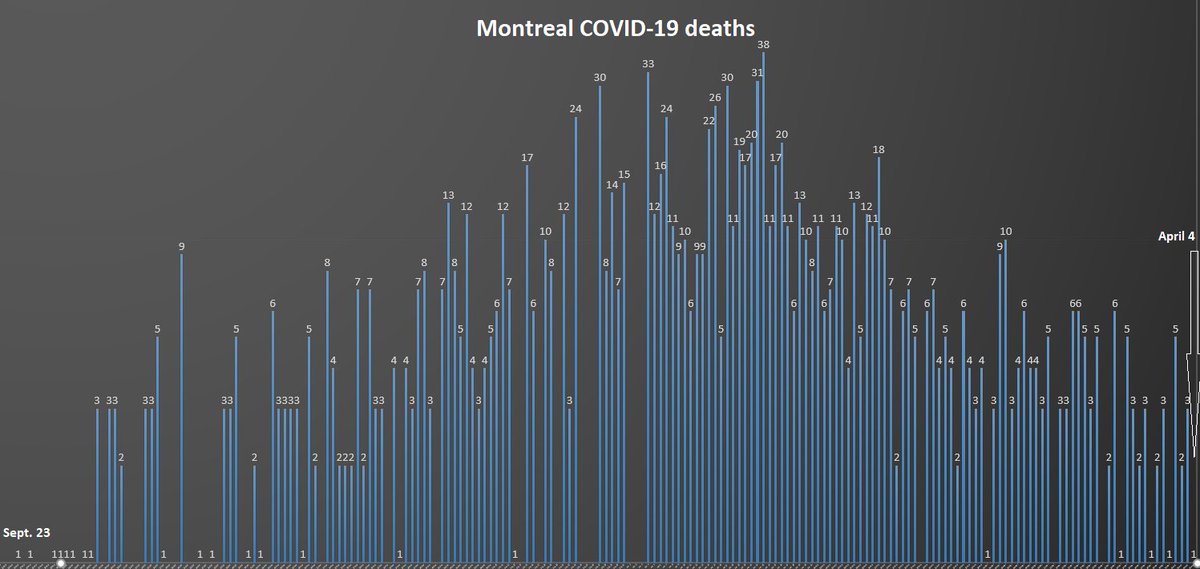
1) It appears that even during the third wave, mass vaccinations in Montreal may be blunting the impact of the more contagious variants, while these strains surge in other regions with much lower inoculation rates. In this thread, I will focus on the vaccination effort.
2) This is not to suggest that the #pandemic is under control in Montreal, as Premier François Legault claimed last week without evidence. More than three quarters of the city’s population has still not received a shot and the variants are still spreading in the metropolis.
3) The #COVID19 variants struck Montreal first, long before the outlying regions, and the city has accumulated the most cases of the more transmissible strains. But it’s worth pointing out that the variants are now surging faster in regions with much lower vaccination rates.
4) As of Saturday, 23.34% of Montreal’s population has been partially vaccinated, compared with 16.31% in the Capitale-Nationale. In contrast, Montreal’s rate of variant cases per 100,000 residents is 177.8, while in the Quebec City region it’s a staggering 251.1. 

5) The other factor to consider is that we now know the Legault government had eased #pandemic restrictions far too early in the Capitale-Nationale and other regions. Quebec City’s over-burdened acute-care hospital system is now paying the price for such half measures.
6) Health professionals inoculated 6,744 people in Montreal on Saturday — less than half the average number — as vaccines have been diverted to other regions. Quebec is expected to receive 230,490 Pfizer doses this week, along with 176,400 Moderna and 71,600 AstraZeneca shots.
7) Quebec has yet to vaccinate the general population under age 60, the people most likely to be infected with the variants. Given this reality and the fact that Montreal is now receiving fewer vaccines, the city still faces a huge challenge as the third wave gathers momentum.
8) Under such circumstances, it was puzzling to say the least for the Quebec government last week to require that Montreal high school seniors return to class five days a week, increasing the likelihood of more variant transmission among students and teachers.
9) Meanwhile, Montreal on Sunday posted a seven-day average of 162.55 #COVID19 cases per 100,000 population, compared with a rate of 151.04 a week ago. The number of #pandemic hospitalizations in the city dipped by six to 254. Please see the chart below. 

10) At the neighborhood level, a somewhat surprising finding is that it’s Saint-Laurent and the north-end of the city that are now driving most of the #coronavirus transmission, as the chart below indicates. Transmission remains high in Côte-des-Neiges. 

11) Although Ontario has been inundated with much younger #COVID19 patients, that’s not yet exactly the case in Quebec. Still, the age groups that are hospitalized the most in Quebec are those in their 50s and 60s, at least 15 years younger than during last spring's first wave. 

12) On Sunday, Quebec added nine more #COVID19 fatalities for a death toll of 10,693. Of that number, 4,269 deaths have been declared in Montreal, up by one since Saturday. End of thread. Please everyone, limit your social contacts and wear a mask in public. 

Addendum: Rereading my thread, I realized that in Tweet number 9, Montreal's rate should be 164.08 cases per million population, not 100,000. The rate per 100,000 is 16.40. Sorry for the error. Lots of numbers!!
• • •
Missing some Tweet in this thread? You can try to
force a refresh







